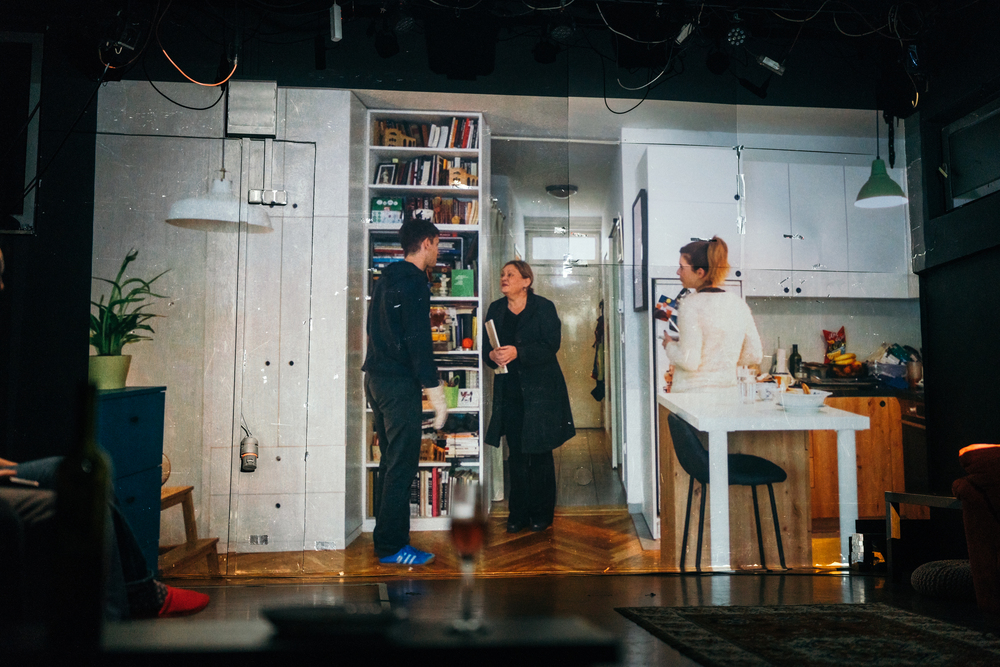Kunst Teatar, Zagreb (part of Zagreb Theatre Showcase 2023)
The lottery is a potent literary device. Take, for example, Chekhov’s short story “The Lottery Ticket“. In it, a game of chance triggers a conflict between husband and wife. Believing that they’ll win the big money, the two indulge in daydreams. They have such different ideas about how to spend the winnings that they begin to despise each other.
Another famous example is the play “Dust” by Hungarian writer Spiró György. Unlike the couple in Chekhov’s story, who turn out not to have won the lottery at all, the poor characters in the Hungarian author’s play are so afraid of the power and responsibility that money brings that they forgo the winnings.
Both authors are interested in the reactions and feelings of the characters immediately after they learn of their winnings. In both the dramatic potential of the lottery was used to create comedy and intrigue.
However, studies conducted on a sample of the English and Australian population from 2014 have shown that left-wing people become conservative after winning more money in lotteries. Having more money has a negative effect on their commitment to equality and solidarity. A sudden influx of finance changes people abruptly.
Croatian writer Ivor Martinić is interested in engaging artistically with the lottery in this way, using it as a way of exploring class struggle and life in the capitalist system. In his play Jackpot, he doesn’t address the characters’ immediate reactions to winning big, nor is he so interested in exploring the humorous potential of such a situation.
The action of his play begins when Sara and Goran, a married couple in their late thirties, have already processed their windfall and planned how to spend it. This all happens on an evening when this friend Sanja comes to visit. The author uses this character to bring the audience closer to the couple’s psychological and ideological transformation. Sanja knows every detail of their lives, their life goals, desires and plans, and is able to see and show the change that people go through when they go from working class to millionaires overnight.
The friends aren’t the people she knew before. Communication with them is difficult. They behave and think differently. Sara and Goran, for example, are planning to buy a flat in the centre, although they have always said that it’s too crowded there and that the suburbs where they currently live are much better. Since they have money, they plan to have children, although this wouldn’t have been the case before. Sara has developed a fascination with expensive wardrobes and seeks media attention.
Sanja also learns that the neighbour who was involved in Goran’s upbringing has cancer, but has no money for treatment. However, the couple is hesitant about whether to participate in saving someone else’s life. Although Sanja knows the couple as people full of compassion, they believe that their lives are full of misery since they got rich, because they found out that there is a sick person on every floor of their building who needs to be paid for treatment. Solidarity and the willingness to share their resources with others disappeared when they won 4.5 million. Winning the jackpot shows that the world we live in is full of misery: many are in debt, have suppressed desires, are crushed by an uncertain and insecure future, treatment is hard to get, and free trips, professional photo sessions, the latest fashion, etc. are offered as solutions. Many such details come up during the evening, emphasising that it’s economic factors that determine life preferences, not the interests of the individual.

Jackpot – Kunst Teatar
The play is performed far away from the centre of Zagreb, on the outskirts of the Croatian capital, in the small, new Kunst Teatar, a space of modest dimensions founded in 2018. The play takes place in a simply furnished room with a table and a sofa, representing Sara and Goran’s flat.
The actors, Sanja Milardović, Iva Jerković and Silvio Vovk, introduce themselves to us under their own names. They talk about their precarious work situation and explain that the characters they play are also unemployed actors. They reveal to us that the play we’re about to see was conceived as a film. But what was meant to be a screenplay became only a play due to lack of money. Some scenes for the film, which will be completed sometime in the future, have already been shot, so we have the opportunity to see them with the help of a video projector. The stage is divided into two areas: one is reserved for the performance of the play, the other is a private area where the actor and actresses can sit and relax. We’re invited not to look at this part of the space.
Martinić, who also directs, uses all these factors related to the play as important artistic signs and juxtaposes the class differences via a stylistic contrast: the location of the Kunst Theatre far away from the centre of Zagreb, the division of the stage space into fictional and factual areas, an acting style that fluctuates between private and professional, a story that wants to be a film script but is only realised on stage and finally through a theatre performance that tries to be as cinematic as possible. Financial status is the basis for all these decisions and divisions.
The cleverly written and directed play is also outstandingly well-performed. Sanja Milardović, in the role of Sanja, portrays a character who loves Sara and Goran very much, but gets into emotional confusion because she sees these familiar people behaving quite differently. Silvio Vovk plays Goran, a man who claims that he always knew that one day he’d win the jackpot. This belief in preordained success is shattered by the realisation that his wife Sarah doesn’t love him as much as he loves her. Sara, played by Iva Jerković, like Goran, is irritated by the inner conflict triggered by Sanja’s presence. She probably only stays in a relationship with Goran because he was the one who hit the jackpot.
The play is at once complex and rich in structure and yet easy to follow, exciting, emotive and often very funny. With this production, the young Kunst Teatar provides a shining example of how an important, smart and entertaining play can be created with few resources.
Credits:
Author and director: Ivor Martinić//Dramaturg: Jelena Kovačić
Cast: Sanja Milardović, Iva Jerković, Silvio Vovk, Ksenija Marinkovic (via video)
For tickets and more information, visit: KunstTeatar.hr
Further reading: Zagreb’s Kunst Teatar: “We want to attract new audiences to theatre.”
Further reading: interview with Ivor Martinić: “Dramaturgs are the most underestimated part of theatre”
Andrej Čanji is a theatre critic and theatrologist based in Belgrade.








